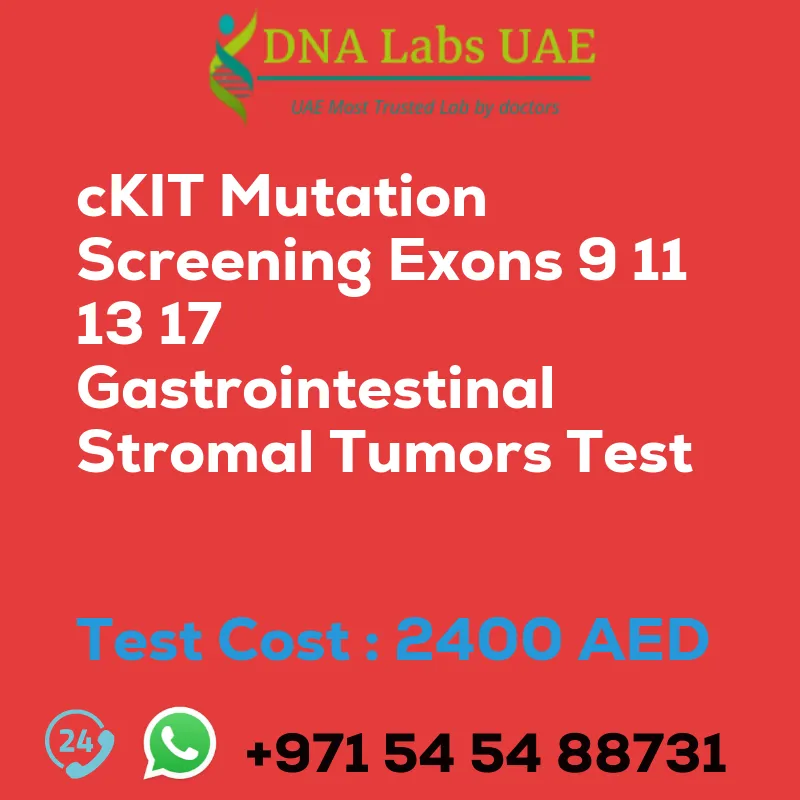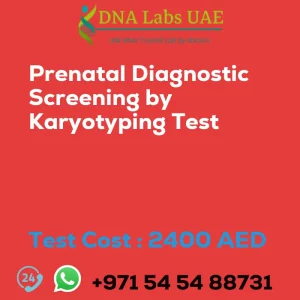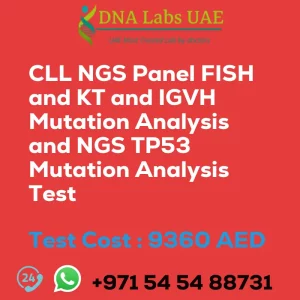cKIT Mutation Screening Exons 9 11 13 17 Gastrointestinal Stromal Tumors Test
Test Name: cKIT Mutation Screening Exons 9 11 13 17 Gastrointestinal Stromal Tumors Test
Components: Paraffin embedded tissue blocks
Price: 2400.0 AED
Sample Condition: Tumor tissue
Report Delivery: 7-8 days
Method: Sanger Sequencing
Test Type: Genetics
Doctor: Gynecologist
Test Department: Pre Test Information
Pre Test Information: cKIT Mutation Screening (Exons 9, 11, 13, 17) Gastrointestinal Stromal Tumors can be done with a Doctor’s prescription. Prescription is not applicable for surgery and pregnancy cases or people planning to travel abroad.
Test Details:
KIT mutation screening is a diagnostic test used to detect mutations in the KIT gene in gastrointestinal stromal tumors (GISTs). GISTs are a type of tumor that originates in the gastrointestinal tract, particularly in the stomach or small intestine. The KIT gene provides instructions for making a protein called KIT receptor, which plays a crucial role in the growth and survival of certain cells, including the cells of the gastrointestinal tract. Mutations in the KIT gene can lead to the overactivation of the KIT receptor, causing uncontrolled cell growth and the development of GISTs.
The screening test focuses on specific regions of the KIT gene, including exons 9, 11, 13, and 17. Exons are the coding regions of genes that contain the instructions for making proteins. Mutations in these exons have been found to be common in GISTs and are associated with the development and progression of the tumors.
The screening process typically involves obtaining a tissue sample from the tumor through a biopsy or surgical procedure. The DNA from the sample is then analyzed using various techniques, such as polymerase chain reaction (PCR) or next-generation sequencing (NGS), to identify any mutations in the KIT gene.
The results of the screening test can help guide treatment decisions for patients with GISTs. Some KIT mutations have been found to be sensitive to specific targeted therapies, such as imatinib, which can inhibit the overactive KIT receptor and slow down the growth of the tumor.
Overall, KIT mutation screening is an important tool in the diagnosis and management of GISTs, allowing for personalized treatment approaches based on the specific genetic characteristics of the tumor.
| Test Name | cKIT Mutation Screening Exons 9 11 13 17 Gastrointestinal Stromal Tumors Test |
|---|---|
| Components | Paraffin embedded tissue blocks |
| Price | 2400.0 AED |
| Sample Condition | Tumors tissue |
| Report Delivery | 7-8 days |
| Method | Sanger Sequencing |
| Test type | Genetics |
| Doctor | Gynecologist |
| Test Department: | |
| Pre Test Information | cKIT Mutation Screening (Exons 9, 11, 13, 17) Gastrointestinal Stromal Tumors can be done with a Doctors prescription. Prescription is not applicable for surgery and pregnancy cases or people planing to travel abroad. |
| Test Details |
KIT mutation screening is a diagnostic test used to detect mutations in the KIT gene in gastrointestinal stromal tumors (GISTs). GISTs are a type of tumor that originates in the gastrointestinal tract, particularly in the stomach or small intestine. The KIT gene provides instructions for making a protein called KIT receptor, which plays a crucial role in the growth and survival of certain cells, including the cells of the gastrointestinal tract. Mutations in the KIT gene can lead to the overactivation of the KIT receptor, causing uncontrolled cell growth and the development of GISTs. The screening test focuses on specific regions of the KIT gene, including exons 9, 11, 13, and 17. Exons are the coding regions of genes that contain the instructions for making proteins. Mutations in these exons have been found to be common in GISTs and are associated with the development and progression of the tumors. The screening process typically involves obtaining a tissue sample from the tumor through a biopsy or surgical procedure. The DNA from the sample is then analyzed using various techniques, such as polymerase chain reaction (PCR) or next-generation sequencing (NGS), to identify any mutations in the KIT gene. The results of the screening test can help guide treatment decisions for patients with GISTs. Some KIT mutations have been found to be sensitive to specific targeted therapies, such as imatinib, which can inhibit the overactive KIT receptor and slow down the growth of the tumor. Overall, KIT mutation screening is an important tool in the diagnosis and management of GISTs, allowing for personalized treatment approaches based on the specific genetic characteristics of the tumor. |








